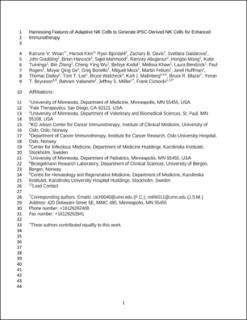| dc.contributor.author | Woan, Karrune V. | |
| dc.contributor.author | Kim, Hansol | |
| dc.contributor.author | Bjordahl, Ryan | |
| dc.contributor.author | Davis, Zachary B. | |
| dc.contributor.author | Gaidarova, Svetlana | |
| dc.contributor.author | Goulding, John | |
| dc.contributor.author | Hancock, Brian | |
| dc.contributor.author | Mahmood, Sajid | |
| dc.contributor.author | Abujarour, Ramzey | |
| dc.contributor.author | Wang, Hongbo | |
| dc.contributor.author | Tuininga, Katie | |
| dc.contributor.author | Zhang, Bin | |
| dc.contributor.author | Wu, Cheng-Ying | |
| dc.contributor.author | Kodal, Behiye | |
| dc.contributor.author | Khaw, Melissa | |
| dc.contributor.author | Bendzick, Laura | |
| dc.contributor.author | Rogers, Paul | |
| dc.contributor.author | Ge, Moyar Qing | |
| dc.contributor.author | Bonello, Greg | |
| dc.contributor.author | Meza, Miguel | |
| dc.contributor.author | Felices, Martin | |
| dc.contributor.author | Huffman, Janel | |
| dc.contributor.author | Dailey, Thomas | |
| dc.contributor.author | Lee, Tom T. | |
| dc.contributor.author | Walcheck, Bruce | |
| dc.contributor.author | Malmberg, Karl-Johan | |
| dc.contributor.author | Balzar, Bruce R. | |
| dc.contributor.author | Bryceson, Yenan | |
| dc.contributor.author | Valamehr, Bahram | |
| dc.contributor.author | Miller, Jeffrey S. | |
| dc.contributor.author | Cichocki, Frank | |
| dc.date.accessioned | 2022-03-21T13:14:10Z | |
| dc.date.available | 2022-03-21T13:14:10Z | |
| dc.date.created | 2021-10-03T18:40:20Z | |
| dc.date.issued | 2021 | |
| dc.identifier.issn | 1934-5909 | |
| dc.identifier.uri | https://hdl.handle.net/11250/2986523 | |
| dc.description.abstract | Select subsets of immune effector cells have the greatest propensity to mediate antitumor responses. However, procuring these subsets is challenging, and cell-based immunotherapy is hampered by limited effector-cell persistence and lack of on-demand availability. To address these limitations, we generated a triple-gene-edited induced pluripotent stem cell (iPSC). The clonal iPSC line was engineered to express a high affinity, non-cleavable version of the Fc receptor CD16a and a membrane-bound interleukin (IL)-15/IL-15R fusion protein. The third edit was a knockout of the ecto-enzyme CD38, which hydrolyzes NAD+. Natural killer (NK) cells derived from these uniformly engineered iPSCs, termed iADAPT, displayed metabolic features and gene expression profiles mirroring those of cytomegalovirus-induced adaptive NK cells. iADAPT NK cells persisted in vivo in the absence of exogenous cytokine and elicited superior antitumor activity. Our findings suggest that unique subsets of the immune system can be modeled through iPSC technology for effective treatment of patients with advanced cancer. | en_US |
| dc.language.iso | eng | en_US |
| dc.publisher | Cell Press | en_US |
| dc.rights | Attribution-NonCommercial-NoDerivatives 4.0 Internasjonal | * |
| dc.rights.uri | http://creativecommons.org/licenses/by-nc-nd/4.0/deed.no | * |
| dc.title | Harnessing features of adaptive NK cells to generate iPSC-derived NK cells for enhanced immunotherapy | en_US |
| dc.type | Journal article | en_US |
| dc.type | Peer reviewed | en_US |
| dc.description.version | acceptedVersion | en_US |
| dc.rights.holder | Copyright 2021 Elsevier Inc. | en_US |
| cristin.ispublished | true | |
| cristin.fulltext | postprint | |
| cristin.qualitycode | 2 | |
| dc.identifier.doi | 10.1016/j.stem.2021.08.013 | |
| dc.identifier.cristin | 1942736 | |
| dc.source.journal | Cell Stem Cell | en_US |
| dc.source.pagenumber | 2062-2075.e5 | en_US |
| dc.relation.project | Kreftforeningen: 190386 | en_US |
| dc.relation.project | Norges forskningsråd: 275469 | en_US |
| dc.relation.project | Stiftelsen Kristian Gerhard Jebsen: SKGJ-MED-009 | en_US |
| dc.identifier.citation | Cell Stem Cell. 2021, 28(12), 2062-2075.e5 | en_US |
| dc.source.volume | 28 | en_US |
| dc.source.issue | 12 | en_US |

